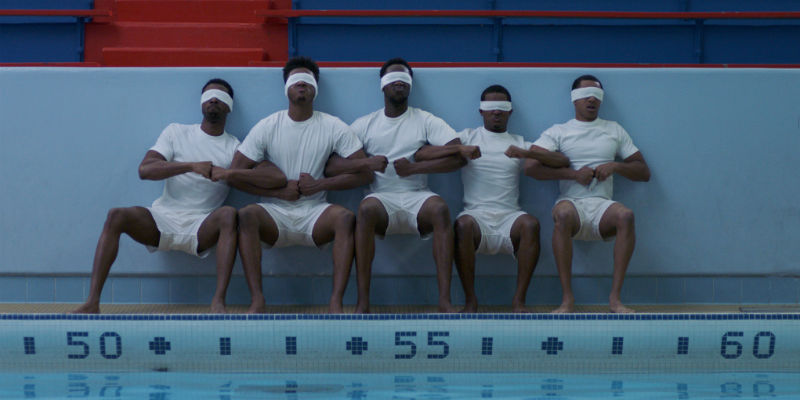




“It’s easier to build strong children than to repair broken men” – that’s the message inside Burning Sands, feature film by Gerard McMurray, who was raised in New Orleans. The film has Trevante Rhodes from the Best Picture Oscar winner Moonlight (Barry Jenkins, 2016) as a supporting actor, and this is not the only similarity between the two films. Burning Sands is a hazing drama almost entirely formed by black actors.
Zurich (Trevor Jackson) is one of the most popular freshmen at Frederick Douglass University, in Pennsylvania. He has joined a prominent and traditional fraternity on campus, seeking brotherhood and compassion. Just like in the film Goat (Andrew Neel, 2016), it is clear that the physical and emotional struggle implied in belonging to a fraternity will end in a tragedy. In this case, it is even stronger, as the violent images reveal some notion of twisted control system where black people abuse black people.
The film is divided in the days of the week culminating at Hell Night, in which freshmen undertake the last task so that they finally are “accepted” within the fraternity. Throughout the week, Zurich is tested to the limits of his sanity. It is imperative for him not to quit – that would be a dishonour. Even the university dean (Steve Harris, also in Spike Lee’s Chi-Raq, 2015) trusts Zurich will get “to the other side”. The dean believes that “humiliation builds humility”.
.

.
Some innovative aspects of the film include the use of voiceover as a clear expression of Zurich’s thoughts. While his body is failing – he is wounded, probably with a broken rib, and short of breath – his mind is telling him to go on. For him, struggle stands for progress.
There is also a wise and meaningful camera move during Hell Night. Zurich and other four freshmen are in a car waiting for the oppressive senior students to lead them to the last task. It is a thrilling moment. Whilst the freshmen leave the car, the camera stays inside, revealing a sense of vulnerability. The same feeling is pervasive throughout Fruitvale Station (Ryan Coogler, 2015), which was produced by McMurray.
Full Metal Jacket (Stanley Kubrick, 1987) is also a big influence for the filmmaker. The opening scene in Kubrick’s cult movie shows the young soldiers having their heads shaven under the sound of “Hello Vietnam” by Johnnie Wright. Kubrick opted not to show the barbers, only the soldiers. In Burning Sands, black seniors are cutting the hair of the black freshmen under the sound of a rap music. McMurray chose to portray the barbers and the boys on the same take. The black rhythm speaks up for the code of silence that those boys share.
Burning Sands is out at Netflix on Friday, March 10th. Don’t forget to watch the film trailer below:
.











